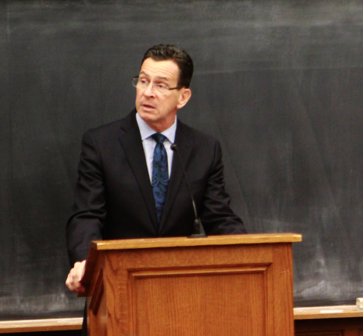
After releasing an austere new state budget earlier this month, Gov. Dannel Malloy brought his case to the people Tuesday night, speaking before Connecticut residents in the atrium of Wilbur Cross High School.
Arguing that the state now faces a prolonged “slow-growth” period even after it recovers from the 2007 Great Recession, Malloy defended his budget’s harsh cuts as part of a new approach to the state’s finances. Connecticut can no longer assume future economic conditions will be the same as they are now, Malloy said. Citizens and legislators will need to rethink spending priorities given that state government is now in an era where it “can’t be everything for everyone.”
Throughout the conference, Malloy emphasized that his duty as governor is to ensure the long-term fiscal health of the state, not just its short-term viability.
“No other state has done what I did to support the services that you’re talking about,” Malloy said in response to a question from New Haven resident Kimberly Rice, referring to the state’s social services. “But my balancing act is to make sure not just that this state is healthy in the next three months, six months, 12 months, but in the next five years, 10 years, 20 years.”
Rice, who said she talked to nearly 5,000 people as a volunteer for Malloy’s 2014 re-election campaign, echoed a common criticism of the governor. With his “austerity” budget, Rice said, Malloy is turning his back on his principles and “abandoning those most in need.”
Malloy fought back against her criticism.
Conceding that his cuts are to be “tolerated, not celebrated,” he said a drop in state tax revenues has made the cuts unavoidable. In response to Rice’s suggestion that the governor should raise taxes on the state’s wealthiest residents, Malloy said he wants to avoid putting Connecticut at a tax disadvantage against other states in the region, a move that could hurt Connecticut’s economic competitiveness.
The night’s tensest exchange came near the end of the public forum, when New Haven Public Schools teacher Peter Wilson questioned why Malloy had chosen to invest heavily in charter schools in urban areas. Wilson said charter schools differ significantly from traditional public schools — and, after a show of hands in the room, he found that nearly all attendees had graduated from traditional public schools. He told Malloy that since public schools have successfully trained the country’s adult population, he doubted the prudence of pouring money into charter schools.
Malloy’s response was fierce. The governor — who was considered mentally deficient until fourth grade — said he is living proof that experimentation in public schools can lead to better results. Furthermore, he said, although charter schools and public schools offer the same quality of education, charter schools allow for more experimentation in teaching styles.
“The kids living in urban environments deserve the same quality education that other people get,” he said, noting that high school graduation rates plummeted in the five years before he became governor. “What has happened is that making alternative investments — if that’s a term you can live with — has changed outcomes.”
After Wilson repeated the claim that charter schools are different from public schools, Malloy said he disagreed fundamentally, emphasizing the importance of “stepping outside the box.”
But the night was not solely a contentious affair. Malloy garnered praise from two attendees for the state’s recent success in eliminating homelessness among veterans.
One of those speakers — Navy veteran and Orange resident Sylvester Salcedo — urged Malloy to save money in the state’s budget by working to end the war on drugs, a policy that describes the treatment of drug use as a prosecutable crime. Salcedo, who said he “served” in the war on drugs, said the money saved should go toward treatment programs for drug addicts, especially in light of rising heroin use in the Northeast.
Malloy said he has made drug reforms a priority of his administration and noted that his decriminalization of marijuana shortly after entering office has led to roughly 8,000 fewer arrests per year. He said he would like to see the state move toward treating addiction as a mental health issue while continuing to combat the state’s consumption of cheap, highly pure heroin.
Malloy ended the forum with a pitch to voters and legislators to come together to make tough decisions on the future of state government in Connecticut. He said the time of borrowing freely without regard for future obligations is over, making reference to former Gov. Jodi Rell’s borrowing $2 billion during her tenure in office.
“What I’m simply saying is, that in a slow-growth economy, which we’re probably going to have for years to come, we’re going to collectively as a community agree on what those real priorities are,” Malloy said. “Otherwise we’re going to have to raises people’s taxes for every year going forward.”







